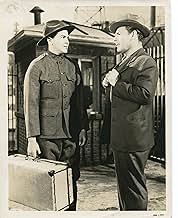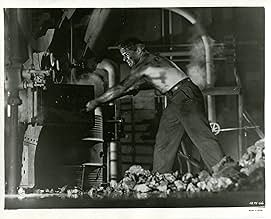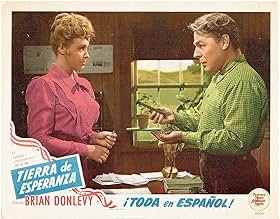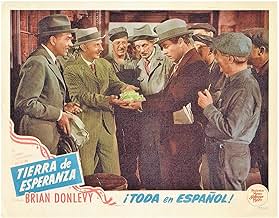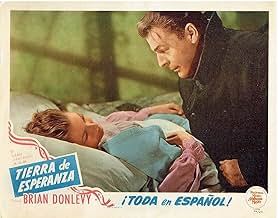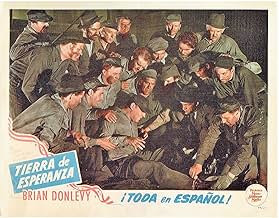NOTE IMDb
6,7/10
614
MA NOTE
Ajouter une intrigue dans votre langueStefan Dangos, an immigrant, starts working in iron mines and steel mills. Through hard work, he rises through the ranks, eventually becoming a successful American industrialist.Stefan Dangos, an immigrant, starts working in iron mines and steel mills. Through hard work, he rises through the ranks, eventually becoming a successful American industrialist.Stefan Dangos, an immigrant, starts working in iron mines and steel mills. Through hard work, he rises through the ranks, eventually becoming a successful American industrialist.
Stephen McNally
- Teddy Roosevelt Dangos
- (as Horace McNally)
- …
Ernie Adams
- Man and Dog Act
- (non crédité)
Fred Aldrich
- Assembly Line Worker
- (non crédité)
Axel Anderson
- Immigrant
- (non crédité)
King Baggot
- Graduation Ceremony Attendee
- (non crédité)
Charles Bates
- Teddy Roosevelt Dangos - Age 8
- (non crédité)
Barbara Bedford
- Hospitable Farm Woman
- (non crédité)
Arthur Belasco
- Drowsy Miner
- (non crédité)
Leon Belasco
- Cigar Store Proprietor
- (non crédité)
Art Berry Sr.
- Customs Man
- (non crédité)
Anna Marie Biggs
- Girl Soprano
- (non crédité)
Histoire
Le saviez-vous
- AnecdotesDuring World War II, there were no passenger car assembly lines in operation. As a result, Vidor had to borrow cars from Chrysler, take them apart and re-assemble them in a simulated assembly line. Seen emerging from the factory are 1942 Plymouths with a Danton insignia and hubcaps. These were the last passenger cars manufactured by Chrysler before the World War II shutdown.
- GaffesAs Steve Dangos closes his front door (after arriving home from the board meeting), a hand and lower arm can also be seen closing the door from the outside.
- Versions alternativesOriginal version premiered at 151 minutes; later cut to 122 minutes.
- Bandes originalesAmerica, My Country Tis of Thee
(1832) (uncredited)
Music by Lowell Mason, based on the Music by Henry Carey from "God Save the King" (1744)
Played during the opening credits
Reprised at the end
Commentaire à la une
Brian Donlevy stars as an immigrant who comes to America in the late 19th century and rises through hard work to become a success.
This film was written, produced, and directed by the great King Vidor at MGM and was meant to be an American industrial epic culminating in a WW II propaganda piece with bombers flying in formation. It was also supposed to be the story of an immigrant and his family. The film was screened at 150 minutes, and Louis B. Mayer demanded the film cut down to 120 minutes. Vidor has no part in the edit, so what remains is a choppy story with lots of documentary-like scenes of industry. Most of the family story got deleted.
Initially set up at MGM to star Spencer Tracy, Ingrid Bergman, and Joseph Cotten, by the time Vidor was ready to film, Mayer balked at the cost and proceeded with a B cast of Brian Donlevy, Ann Richards, and Walter Abel. John Qualen and Stephen McNally are the only other name actors in the cast.
Saddled with a B cast, Vidor still tried to make the film he envisioned, but there are far too many cost-saving things going on, especially the cheesy sets. While there are some location shots, these are pretty much confined to industrial scenes.
The real pity is that Donlevy gives a terrific performance as does Abel in a much-reduced part. Australian-born Richards, however, is pretty bad, and her accent seems to change in every scene. With the family stuff omitted by Mayer, the narrative is choppy and the "heart" of the film is gone.
It's no surprise that after this bowdlerized version was released in 1944, it was a major flop. MGM lost a bundle and Vidor never worked for the studio again.
This film was written, produced, and directed by the great King Vidor at MGM and was meant to be an American industrial epic culminating in a WW II propaganda piece with bombers flying in formation. It was also supposed to be the story of an immigrant and his family. The film was screened at 150 minutes, and Louis B. Mayer demanded the film cut down to 120 minutes. Vidor has no part in the edit, so what remains is a choppy story with lots of documentary-like scenes of industry. Most of the family story got deleted.
Initially set up at MGM to star Spencer Tracy, Ingrid Bergman, and Joseph Cotten, by the time Vidor was ready to film, Mayer balked at the cost and proceeded with a B cast of Brian Donlevy, Ann Richards, and Walter Abel. John Qualen and Stephen McNally are the only other name actors in the cast.
Saddled with a B cast, Vidor still tried to make the film he envisioned, but there are far too many cost-saving things going on, especially the cheesy sets. While there are some location shots, these are pretty much confined to industrial scenes.
The real pity is that Donlevy gives a terrific performance as does Abel in a much-reduced part. Australian-born Richards, however, is pretty bad, and her accent seems to change in every scene. With the family stuff omitted by Mayer, the narrative is choppy and the "heart" of the film is gone.
It's no surprise that after this bowdlerized version was released in 1944, it was a major flop. MGM lost a bundle and Vidor never worked for the studio again.
Meilleurs choix
Connectez-vous pour évaluer et suivre la liste de favoris afin de recevoir des recommandations personnalisées
Détails
Box-office
- Budget
- 3 000 000 $US (estimé)
- Durée2 heures 31 minutes
- Rapport de forme
- 1.37 : 1
Contribuer à cette page
Suggérer une modification ou ajouter du contenu manquant

Lacune principale
By what name was Une romance américaine (1944) officially released in India in English?
Répondre
